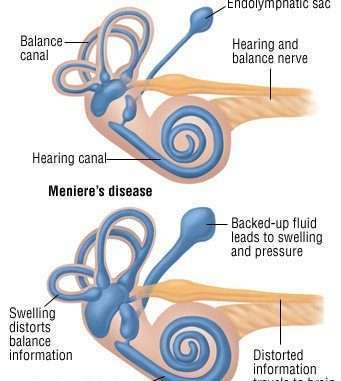
Meniere’s disease is a disorder that affects the inner ear. The inner ear is responsible for hearing and balance. However, this condition causes vertigo, the sensation of spinning. This leads to hearing problems and a ringing sound in the ear. Meniere’s disease may develop slowly over time with a gradual loss of hearing. Attacks can last from 10 minutes to several hours. The disease can occur at any age, but it usually starts between young and middle-aged adults. In most cases, Meniere’s disease affects only one ear. It is a chronic condition., but various treatments can help relieve symptoms.
Symptoms.
Symptoms vary from person to person. However, some will experience many attacks over days, while others will have an isolated attack once in a while.
Loss of clear hearing.
Loss of balance.
Noise in the ear.
Hearing loss.
Ear fullness.
- Grady Trimble Bio, Wiki, FBN, Age, Education, Height, Family, Wife, Children, and Career
- Ashley Michels bio- age, children, husband, net worth.
- Gaston Glock age, family, wife, children, death, net worth.
- TB Joshua age, origin, controversy issues, wife, children, worth.
- James Menendez Bio, Wiki, BBC London, Age, Education, Height, Family, Wife, Children, and Career
- Roselinda Soipan Bio, Age, husband, Net worth
- Cory Hardrict age, family, wife, children, career, and movies.
Sensitivity to noise.
Nausea.
Headaches.
Causes.
The cause of Meniere’s disease is not known. However, the scientist believes it is caused by changes in the fluid in tubes of the inner ear. Other suggestion causes include autoimmune disease, allergies, and genetics.
stages.
Meniere’s disease commonly affects people in various stages.
Early-stage- during this time, a person will experience sudden and often out-of-the-blue episodes of vertigo that lasts from 20 minutes to an entire day. However, it is also common to feel the effects of tinnitus.
middle stage- symptoms of vertigo tend to become less severe during this stage while hearing and tinnitus will increase. Nevertheless, people will also experience long-term remission that can last several months.
The last stage- during the last stage, patients will not suffer from vertigo as often. However, tinnitus and hearing loss will likely get progressively worse. People will also likely experience unsteady balance regularly. Most people at this stage fell unstable in dark lighting conditions.
Treatment.
Meniere’s disease is a chronic condition with no cure. However, there is a range of treatments that can help with the symptoms.
Surgery- endolymphatic sac procedure is done to help decrease the production of fluid. In addition, it also promotes fluid drainage in the inner ear.
Hearing aids- an audiologist can treat hearing loss. Usually done by fitting you with a hearing aid.
Physical therapy- vestibular rehabilitation experiences can improve symptoms of vertigo. These exercises help to train the brain to account for the difference in balance between the two ears.
Medication- doctors may prescribe medication to help with the symptoms of Meniere’s disease. Medicines for motion sickness can ease symptoms of vertigo, nausea, and vomiting. A problem with fluid in the inner ear is thought to cause Meniere’s disease. If this occurs, the doctor may prescribe a diuretic, to help reduce the amount of fluid in the body.
- A list of special secondary schools, and contacts.
- How is The Lenana Boy school and location?
- Kenya Institute of special education, courses.
- Public Universities in Kenya
- Best Public High Schools in Kiambu County.
- Bay head elementary school history, enrolment, programs offered.
- Mount Kenya University history, fees, courses